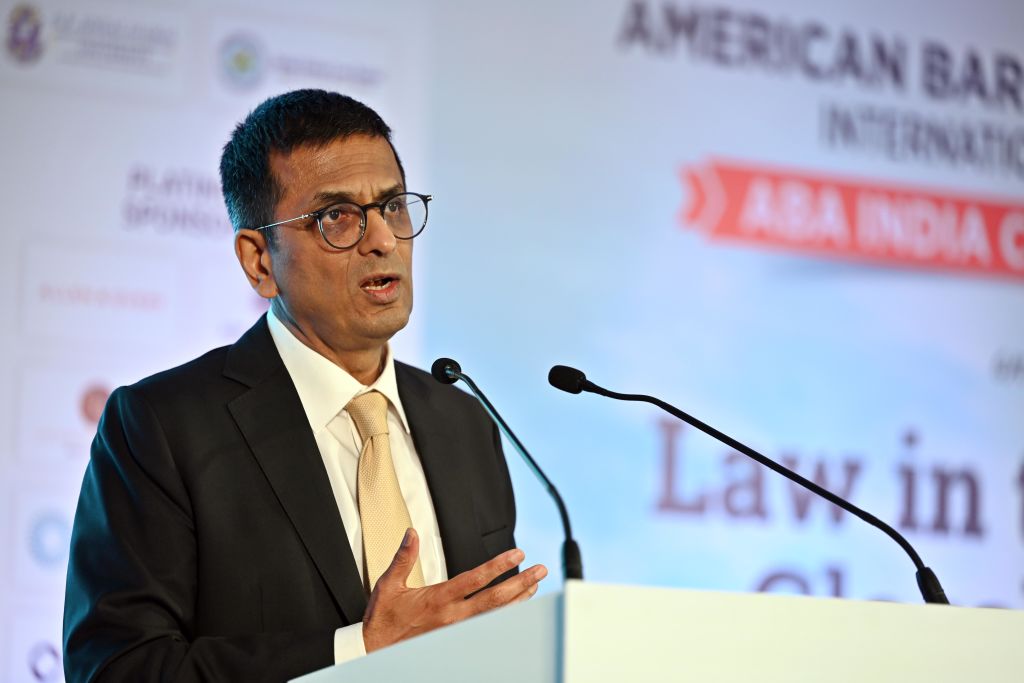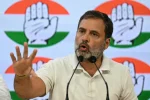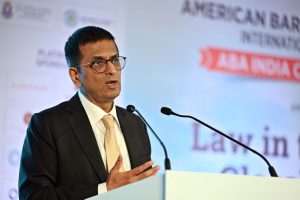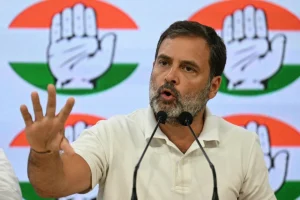Former Chief Justice of India (CJI) DY Chandrachud has responded to recent remarks made by Congress leader Rahul Gandhi, clarifying the judiciary’s role in India’s democratic framework. He emphasized that the judiciary’s duty is to scrutinize laws and interpret them, rather than assume the functions of a political entity such as the Opposition in Parliament or state legislatures. This statement by the former CJI comes as a reaction to Gandhi’s comments, which suggested that the Opposition is playing the role of the judiciary in the country.
Chandrachud’s comments sparked renewed discussion on the independence of the judiciary and its relationship with the political sphere. While the former CJI did not directly address Gandhi’s statement, he made it clear that the judiciary must remain separate from political functions and focus solely on its core responsibility: reviewing and interpreting laws passed by the legislature.
Background: Gandhi’s Statement and Its Context
Rahul Gandhi, who serves as the Leader of the Opposition in the Lok Sabha, had made the comment that the Opposition is fulfilling the role traditionally attributed to the judiciary. He said, “We are alone working on the behalf of media, investigative agencies, and judiciary also. This is the reality of India.” Gandhi’s remarks alluded to the belief that in certain instances, the Opposition in India has had to take on the mantle of holding the government accountable in ways that, according to him, the judiciary and other institutions should be doing.

In the context of his statement, Gandhi appeared to be expressing dissatisfaction with the way certain issues, such as corruption and accountability, were being handled in India. He seemed to imply that, while these matters should ideally be dealt with by the judiciary and law enforcement agencies, it is the Opposition that has been forced to bear the responsibility of addressing these concerns in the public sphere.
This statement, coming from a prominent leader of the opposition, drew attention to the perceived inadequacies in the functioning of the judiciary and other institutions of accountability. However, it also raised questions about the separation of powers and the roles of the different branches of government in India.
Chandrachud’s Response: Judiciary’s Independence
In his response to the controversy stirred by Gandhi’s comments, former CJI DY Chandrachud was clear in articulating the proper role of the judiciary in a democratic system. Chandrachud emphasized that the judiciary’s primary role is to scrutinize laws and ensure they align with the Constitution of India. This responsibility, according to him, should not extend into the realm of politics.
Chandrachud explained that the judiciary must interpret and apply laws in a manner that upholds the principles of justice, fairness, and equality. However, it should not take on the political functions that belong to the legislature or the opposition. He further added, “People should not presume that the judiciary should be performing the role of the opposition in Parliament or the state legislatures.”
By making this point, Chandrachud reinforced the notion of judicial independence, which is vital to the proper functioning of a democracy. According to him, the judiciary’s role is not to engage in political debates or to act as a check on the government in the same manner that the Opposition does in Parliament. Rather, the judiciary is meant to examine laws objectively, without political bias, and ensure that they conform to constitutional norms.
Importance of Judicial Independence
Chandrachud’s remarks highlight a crucial principle in any democracy: the separation of powers between the executive, legislature, and judiciary. Each of these branches of government has distinct and non-overlapping roles to play. The judiciary, as the custodian of the Constitution, is tasked with interpreting laws and safeguarding the fundamental rights of citizens. It is not designed to function as a political player or to compete with the roles of elected representatives.
सम्बंधित ख़बरें





The independence of the judiciary is a cornerstone of democratic governance. When the judiciary is free from external pressures, it can uphold the rule of law, provide fair and impartial justice, and act as a safeguard against potential overreach by the other branches of government. For this reason, it is essential that the judiciary not be seen as an extension of any political party or ideological faction.
By stressing that the judiciary’s primary function is to scrutinize laws, Chandrachud reaffirmed the importance of an independent judiciary in ensuring that justice is served without fear or favor. It is this objectivity that makes the judiciary an essential pillar in India’s democratic structure.
Informal Interactions Between Judicial Figures and Politicians
Another aspect of Chandrachud’s statement that garnered attention was his remarks about the informal interactions that can occur between judicial figures, such as the Chief Justice, and politicians, including the Prime Minister and the Leader of the Opposition.
When questioned about the nature of these interactions, Chandrachud provided some clarity, explaining that, like anyone else, judges occasionally engage in informal conversations after official meetings. He clarified that while formal meetings between the Chief Justice and political figures are sometimes necessary for the smooth functioning of government, the conversations that follow these meetings can be informal and may cover a variety of topics. “After you’re done with those conclusions, you are human beings, right? You’re going to spend 10 minutes after that having a cup of tea, talking about everything under the sun from cricket to movies to something,” he said.
While such casual discussions are common in many workplaces, Chandrachud’s comments reflect an important distinction between informal interactions and the formal duties of judges. The key point he made was that despite these informal exchanges, judges must remain neutral and independent in their official capacity. These personal conversations should not be allowed to influence their judicial decisions or actions.
Safeguarding the Judiciary’s Role in Democracy
Chandrachud’s response is a reminder of the delicate balance that must be maintained between the branches of government in a democracy. It is essential that the judiciary is able to operate without undue political influence or external pressures. When the judiciary is seen as impartial and independent, it can effectively act as a check on government power and ensure that laws are applied fairly and justly.
At the same time, it is also important for political leaders and the public to respect the boundaries between the judiciary and the political sphere. While it is natural for politicians to call attention to perceived issues with the functioning of government institutions, it is crucial that the judiciary is allowed to perform its role without being drawn into the political fray.
Former CJI DY Chandrachud’s remarks serve as an important reminder of the need to safeguard the independence of the judiciary in India. By clarifying the judiciary’s role as one of law scrutiny and interpretation, he reinforced the idea that the judiciary should not be expected to fulfill the role of the opposition in Parliament. As India continues to navigate complex political and legal challenges, ensuring the independence of its judiciary will remain critical in maintaining the integrity of the democratic system.











